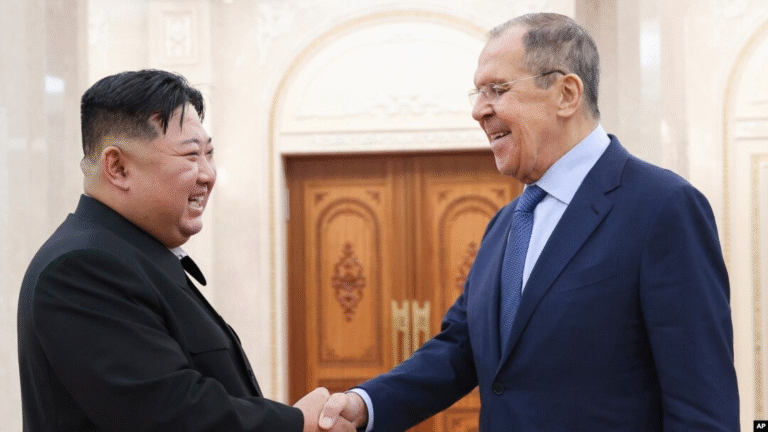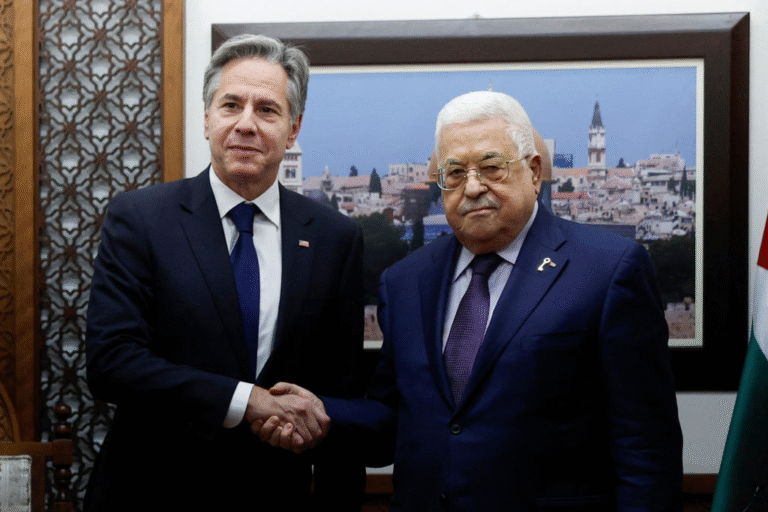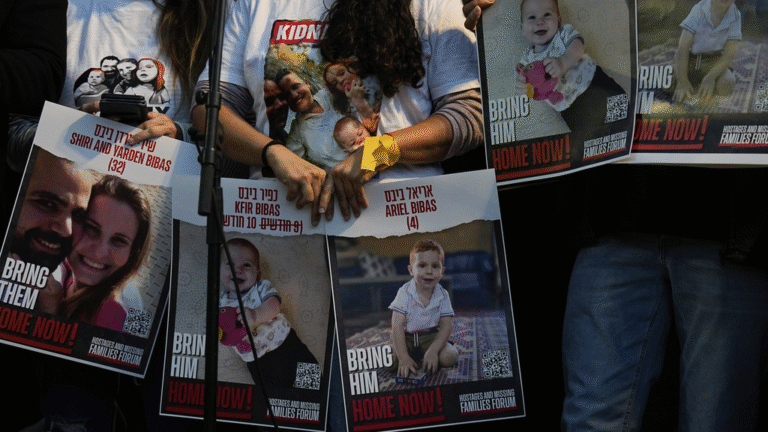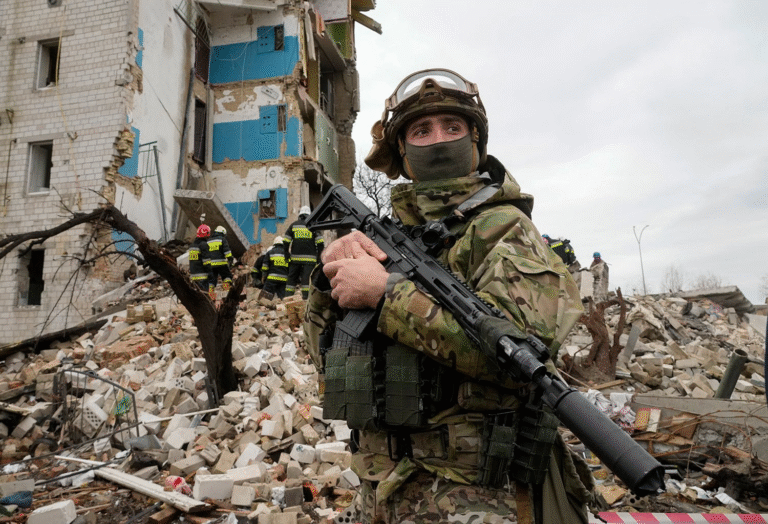
Israeli soldiers lined up in a field near the border of the Gaza Strip.
Photo Credits: Ronen Zvulun/Reuters
Ava Lindstom
The America-Eurasia Center
www.EurasiaCenter.org
Eurasia Brief
Middle East/International Security Programs
The Israel-Hamas War Continues to Expand
Internationally as Gazans Are Forced to Flee Their Homes

An aid truck arrives in Gaza on October 21, Photo Credits: Mohammed Salem/Reuters
Since the initial attack from Hamas, the Islamic militant group that killed over a thousand Israelis on
October 7, the Israel Defense Forces (IDF) and Israeli government have continued to attack Gaza through
airstrikes, with a ground strike predicted to happen soon, although the exact timeline is uncertain. Since
October 7, the total death toll is almost 5,000 killed: 3,478 in Gaza, 69 in the occupied West Bank, and 1,400 in
Israel.1 In addition, there have been 12,065 others wounded in Gaza, 1,300 in the West Bank, and 3,800 in
Israel.2 This war has become the deadliest in both the Israeli and Palestinian history since Israel’s establishment
in 1948. Over one million Gazans have been displaced by the destruction of homes and critical infrastructure
and the Israeli government’s request to evacuate in the northern part of Gaza. Aside from this call to leave the
north by the Israeli government, airstrikes continued across the entirety of Gaza,
including the areas that Israel had declared “safe zones.”1 Gazans have nowhere to go because Egypt and other
Arab countries have not opened their borders to the influx of Palestinian refugees. However, Israeli Prime
Minister Netanyahu said that humanitarian aid would be allowed in from Egypt with help from the United
Nations after Biden made an agreement with Egypt.2 Adding onto the Gazan death toll, on Tuesday, the New
York Times and the Wall Street Journal stated that a fatal explosion at the Al-Ahli Baptist Hospital in Gaza was
caused by an Israeli airstrike, quoting Palestinian officials. The blast killed over 500 people.3 In response,
Israelis denied the attack, which is backed by Israel and United States intelligence programs.
They said it was a failed rocket launch by Islamic Jihad, an Islamist militant group rivaled with Hamas.
Islamic Jihad also denied responsibility for the attack. Dr. Fadel Na’eem, head of the orthopedic department at
Al-Ahli Baptist Hospital, said he was in surgery when he heard the blast, and staff members were running in
wailing for help with reports of many casualties. He told CNN, “I just finished one surgery, and suddenly we
heard a big explosion; we thought it was outside the hospital because we never thought that they would bomb
the hospital.”4 Felt by many, the magnitude of death and devastation was abominable. The difficulty for the
public and the media to report correctly on the blast highlighted the challenges and confusion of the war even
more, especially with the use of differing language and blame varying from source to source. This tragedy makes
many people worldwide question what is at stake here as the United Nations has called for a careful
investigation, which will leave citizens wondering who was responsible without concrete evidence until the
investigation results are released. Several Arab countries, including Saudi Arabia, Jordan, Egypt, the United
Arab Emirates, and Iraq, have condemned Israel and accused its military of bombing the hospital.5

Women and children wounded and grieving after a hospital blast, killing 500 Palestinians, Gaza City
Photo Credits: Abdelhakim Abu Riash/Al-Jazeera
As the accounts of the hospital blast loom, United States President Biden visited Tel Aviv, Israel, to meet
with Israeli Prime Minister Netanyahu and other high-ranking Israeli officials this week. This visit marks the
first United States president to visit Israel while the country has been at war.6 Biden has continued to be
unequivocally faithful in his support of Israel since the October 7 attacks by Hamas. His administration’s
response to the war in Gaza has created outrage and a mixed reaction from the American public; many people
left feeling that President Biden is ignoring 75 years of Palestinian oppression at the hands of Israel. Josh Paul,
Director of Congressional and Public Affairs at the United States State Department’s Bureau of Political-Military
Affairs, resigned on Wednesday because of his opposition to how Biden’s executive office decided to send
additional military aid to Israel without considering Palestinians.7 He said in a statement on LinkedIn
announcing his resignation, “an impulsive reaction built on confirmation bias,” following with, “But I believe to
the core of my soul that the response Israel is taking, and with it the American support both for that response
and for the status quo of the occupation, will only lead to more and deeper suffering for both the Israeli and the
Palestinian people — and is not in the long term American interest.”8 Amidst these frustrations from high
ranking officials and civilians alike, Biden has announced new sanctions against Hamas leaders and is seeking
$105 billion security package that includes $10.6 billion in an emergency funding package to support Israel.9 He
has voiced concerns over an escalation in the Levant, cautioning the Israeli government against a long-term
Gaza occupation in response to Israeli Minister of Defense Yoav Gallant’s promise of “the total annihilation of
Hamas Organization.” He also has publicly acknowledged and emphasized that the “vast majority of
Palestinians are not Hamas.”10

President Biden meets with Israeli Prime Minister Benjamin Netanyahu in Tel Aviv,
Israel Photo Credit: Miriam Alster/Reuters
As tensions between countries in the Levant grow, the possibility and risk of a wider war grows daily.
As Israel calls for the utter destruction of Hamas, it also faces threats from other Arab countries in the region.
Israel is preparing for a massive ground offensive in Gaza while it continues to bomb the area, even though the
United States has encouraged the IDF not to go forward with a ground attack. In addition, Iran has warned
Israel that if Israel enters Gaza, it will possibly ask allied forces to intervene. Iran, which funds Hezbollah and
Hamas, has warned Israel over the past few days that an escalation will become inescapable if the Gaza attacks
continue. Iran stated they may intervene to “prevent the genocide” of Palestinians. Israel is also consistently
exchanging fire with Hezbollah, a Lebanese militant group. Rockets are also coming from Syria from other
Iranian-backed groups. Because the United States has signaled a grave concern over the growing conflict and
possible escalation, it has sent two carrier strike groups and put around 2,000 troops on ready-to-deploy orders,
warning Iran not to get involved.11
While President Biden was in the Levant, he was supposed to meet with Palestinian Authority
President Mahmoud Abbas. However, Abbas reportedly canceled the meeting, communicating that the situation
is intensifying and few available diplomatic paths are now collapsing. Linda Robinson, a senior fellow at the
Council on Foreign Relations, stated that “the U.S. signaling has been very heavily pro-Israel, and they have
only been moderating it with the need to protect civilian Palestinians in recent days,” she added, “What
[strategy] is happening is not working.”12
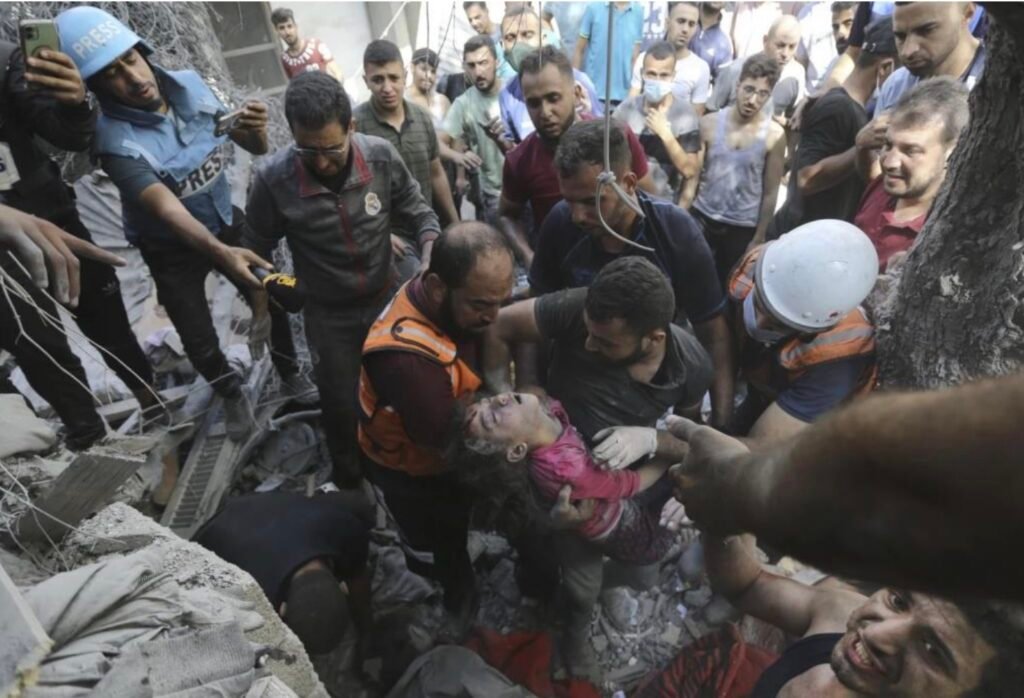
Palestinians rescue a child found under rubble after an Israeli airstrike in Gaza City
Photo Credits: Abed Khaled, AP Photo
United Nations experts have said that Palestinians are at serious risk of mass ethnic cleansing, calling for
a ceasefire between Hamas and Israeli occupation forces with the help of mediation by the international
community before the conflict goes to a point of no return, which the United Nations warns is coming soon. “
Accountability for international crimes committed by Israeli occupation forces and Hamas must also be
immediately pursued,” Francesca Albanese, UN Special Rapporteur on the situation of human rights in the
Palestinian Territory occupied since 1967, “Grave danger that what we are witnessing may be a repeat of the
1948 Nakba, and the 1967 Naksa, yet on a larger scale.” She added, “Again, in the name of self-defense, Israel
seeks to justify what would amount to ethnic cleansing.”11 The United Nations has agreed to the aid to enter
Gaza from Egypt. Per the agreement, the United Nations flag will be raised at the Rafah border, and
international observers will inspect the aid to guarantee no weapons. The first aid trucks entered Gaza briefly on
Saturday morning, October 21, but rights groups have emphasized the need for more aid. United States
Secretary of State Antony Blinken has also called for the Rafah border to remain open.12 As conditions continue
to become more desolate, Gazans are becoming more desperate by the minute since Israel ordered a “complete
siege” after the October 7 attacks.13
- Associated Press, “Live Updates: What’s Happening on Day 13 of the Israel-Hamas War,” PBS, October 19, 2023, https://www.pbs.org/newshour/world/live-updates-whats-happening-on-day-13-of-the-israel-hamas-war. ↩︎
- Ibid. ↩︎
- Atia Darwish/Zuma Press, “Confusion over Gaza Hospital Blast Shows Challenge for Journalists Covering
Israel-Hamas Conflict,” The Wall Street Journal, October 19, 2023, https://www.wsj.com/business/media/confusionover-gaza-hospital-blast-shows-challenge-for-journalists-covering-israel-hamas-conflict-238922b9. ↩︎ - Rob Picheta, “The Devastating Gaza Hospital Blast Is Shrouded in Uncertainty. Here’s What We Know, and What We Don’t,” CNN, October 19, 2023, https://www.cnn.com/2023/10/18/middleeast/gaza-hospital-explosion-israelwwk-explainer-intl/index.html. ↩︎
- Ibid. ↩︎
- U.S. State Department official resigns over military aid to Israel, accessed October 20, 2023,
https://www.axios.com/2023/10/19/us-state-department-official-resigns-israel-military-aid. ↩︎ - Ibid. ↩︎
- Ibid. ↩︎
- Karoun Demirjian, “Biden Is Expected to Request $100 Billion for Israel, Ukraine and Other Crises.,” The New York Times, October 19, 2023, https://www.nytimes.com/2023/10/18/us/politics/biden-funds-israel-ukrainetaiwan.html. ↩︎
- “Biden Announces Gaza Aid Deal as Israel Trip Marred by Hospital Blast,” NBCNews.com, October 20, 2023, https://www.nbcnews.com/news/world/live-blog/israel-hamas-war-live-updates-rcna121166. ↩︎
- Why the risk of wider war in Middle East is ‘very, very high,’ accessed October 20, 2023,
https://thehill.com/policy/defense/4261591-why-the-risk-of-wider-war-in-middle-east-is-very-very-high/. ↩︎ - Why the risk of wider war in Middle East is ‘very, very high,’ accessed October 20, 2023,
https://thehill.com/policy/defense/4261591-why-the-risk-of-wider-war-in-middle-east-is-very-very-high/. ↩︎
